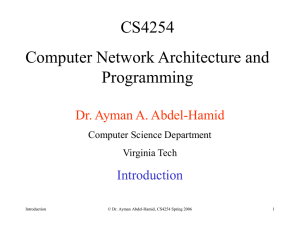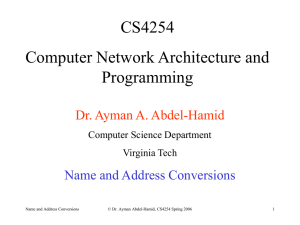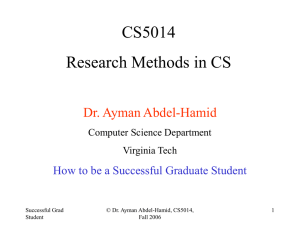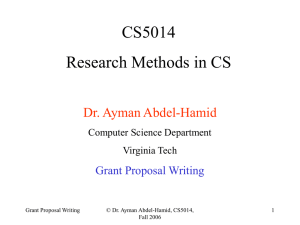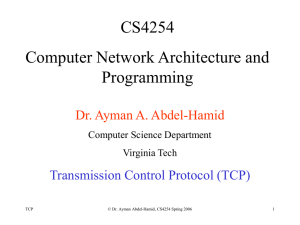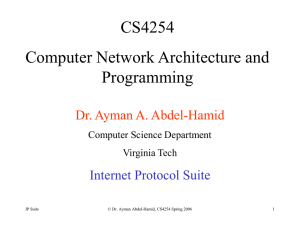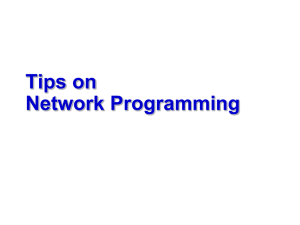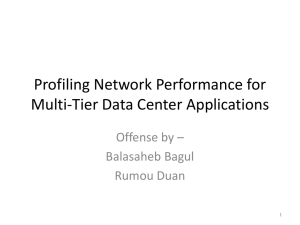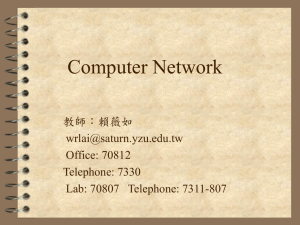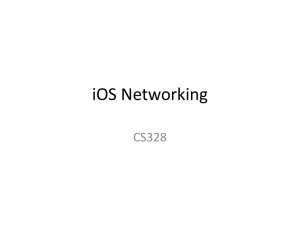ElementaryTCPSockets
advertisement
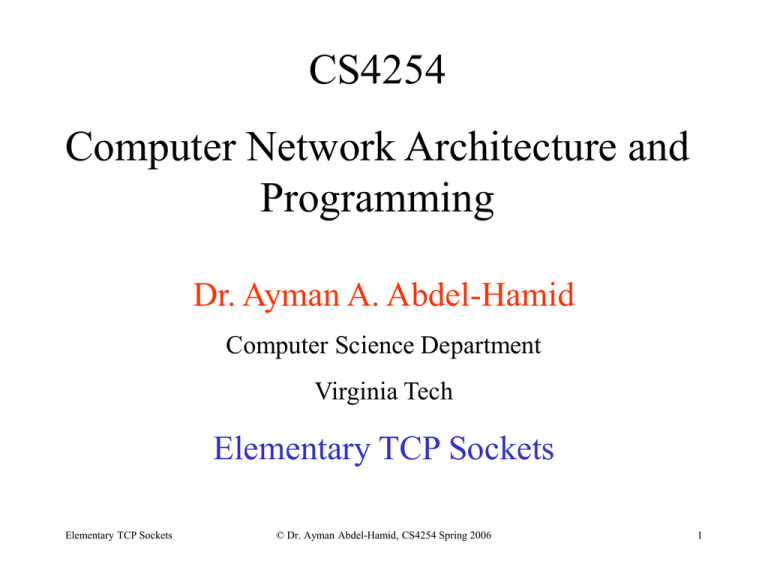
CS4254 Computer Network Architecture and Programming Dr. Ayman A. Abdel-Hamid Computer Science Department Virginia Tech Elementary TCP Sockets Elementary TCP Sockets © Dr. Ayman Abdel-Hamid, CS4254 Spring 2006 1 Outline •Elementary TCP Sockets Information to write a complete TCP client and server Elementary TCP Sockets © Dr. Ayman Abdel-Hamid, CS4254 Spring 2006 2 Typical Scenario between TCP client/server Elementary TCP Sockets © Dr. Ayman Abdel-Hamid, CS4254 Spring 2006 3 socket Function #include <sys/socket.h> int socket (int family, int type, int protocol) // returns non-negative descriptor if OK, -1 on error family protocol family (AF_INET IPv4 protocols, AF_INET6 IPv6 Protocols) (see Fig. 4.2) type (SOCK_STREAM stream socket, SOCK_DGRAM Datagram socket) (see Fig. 4.3) protocol Use 0 to get system’s default given combination of family and type (see Fig. 4.4) Elementary TCP Sockets © Dr. Ayman Abdel-Hamid, CS4254 Spring 2006 4 connect Function 1/3 #include <sys/socket.h> int connect (int sockfd, const struct sockaddr * servaddr , socklen_t addrlen) // returns 0 if OK, -1 on error •No need to specify client’s source IP address or port Kernel will choose an ephemeral port and source IP if necessary •Connect function initiates TCP’s three-way handshake •Function returns only when connection is established or an error occurs Elementary TCP Sockets © Dr. Ayman Abdel-Hamid, CS4254 Spring 2006 5 connect Function 2/3 Several possible errors (The following numbers for 4.4 BSD) Send SYN....& after 6 seconds..& after 24 seconds if after a total of 75 seconds no SYN-ACK received ETIMEOUT is returned if server responds with RST no process waiting at port hard error ECONNREFUSED is returned if a router returns ICMP destination unreachable (soft error) send after 6 and 24 seconds and if no connection after 75 seconds EHOSTUNREACH is returned •You can't reconnect the socket to another address unless you close and call socket again. Elementary TCP Sockets © Dr. Ayman Abdel-Hamid, CS4254 Spring 2006 6 connect Function 3/3 •Try it out with the daytime TCP client/server Successful connection IP address on local subnet, but host nonexistent Connection timed out Correct local IP address, not running a daytime server Connection refused Unreachable Internet IP address Intermediate router will return ICMP error No route to host •Reasons for RST segment SYN arrives for a port with no listening server TCP wants to abort an existing condition TCP receives a segment for a connection that does not exist Elementary TCP Sockets © Dr. Ayman Abdel-Hamid, CS4254 Spring 2006 7 bind Function 1/2 #include <sys/socket.h> int bind (int sockfd, const struct sockaddr * myaddr , socklen_t addrlen) // assigns a local protocol address returns 0 if OK, -1 on error Server (see daytimetcpsrv3.c in intro folder) Normally bind to a well know port & INADDR_ANY Using port 0: kernel choose a free port and we use getsockname to find the selected port When a connection is accepted, the address of the connection is fixed and we use getsockname to find the interface IP address You can bind to specific IP address instead of INADDR_ANY, only connections to this address are accepted Can generate EADDRINUSE error Elementary TCP Sockets © Dr. Ayman Abdel-Hamid, CS4254 Spring 2006 8 bind Function 2/2 Client (see daytimetcpcli3.c in intro folder) Normally do not bind to any specific port or address As part of connect bind is implicitly called Any ephemeral port and interface IP address is filled based on the routing table Use getsockname to find out the port and address struct sockaddr_in servaddr, cliaddr; len = sizeof(cliaddr); Getsockname(sockfd, (SA *) &cliaddr, &len); printf("local addr: %s\n", sock_ntop((SA *) &cliaddr, sizeof(cliaddr))); Elementary TCP Sockets © Dr. Ayman Abdel-Hamid, CS4254 Spring 2006 9 listen Function 1/4 #include <sys/socket.h> int listen (int sockfd, int backlog) //returns 0 if OK, -1 on error •When a socket created assumed active socket A client socket that will issue a connect •listen converts an unconnected socket into a passive socket •backlog specifies maximum number of connections the kernel should queue for this socket •Kernel maintains 2 queues Incomplete connection queue (only SYN received from client) Completed connection queue (three-way handshake done) Elementary TCP Sockets © Dr. Ayman Abdel-Hamid, CS4254 Spring 2006 10 listen Function 2/4 Elementary TCP Sockets © Dr. Ayman Abdel-Hamid, CS4254 Spring 2006 11 listen Function 3/4 Elementary TCP Sockets © Dr. Ayman Abdel-Hamid, CS4254 Spring 2006 12 listen Function 4/4 •Berkeley-derived implementations add a fudge-factor to the backlog (multiplied by 1.5 backlog of 5 allows up to 8 queued entries). See figure 4.10 •A backlog of 0 is not recommended (different implementations) •Specifying a backlog inside source code is a problem! (growing number of connections to handle) Specify a value larger than supported by kernel kernel truncates value to maximum value that it supports Textbook uses an environment variable for backlog (see lib/wrapsock.c) •If queues are full when client SYN arrives Ignore arriving SYN but do not send a RST (Why?) •Data that arrives after 3WHS, but before a call to accept should be queued by TCP server Elementary TCP Sockets © Dr. Ayman Abdel-Hamid, CS4254 Spring 2006 13 accept Function #include <sys/socket.h> int accept (int sockfd, struct sockaddr * cliaddr, socklen_t * addrlen) //returns non-negative descriptor if OK, -1 on error •cliaddr and addrlen used to return protocol address of connected peer process •Set to null if not interested in identifying client •addrlen is a value-result argument •Difference between listening socket and connected socket •See daytimetcpsrv1.c •getsockname return the same port number for listening and connected socket Elementary TCP Sockets © Dr. Ayman Abdel-Hamid, CS4254 Spring 2006 14 Server Concurrency •Servers use concurrency to achieve functionality and performance •Concurrency is inherent in the server must be explicitly considered in server design •Exact design and mechanisms depend on support provided by the underlying operating system •Achieved through Concurrent processes Concurrent threads (will cover later) Can you differentiate between the two design methodologies? Elementary TCP Sockets © Dr. Ayman Abdel-Hamid, CS4254 Spring 2006 15 fork Function #include <unistd.h> pid_t fork (void) //returns 0 in child, process ID of child in parent, -1 on error •A child has only 1 parent, can obtain parent ID by calling getppid •Parent can not obtain IDs of its children unless keep track from return of fork •All descriptors open in parent before call to fork are shared with child after fork returns (connected socket shared between parent and child) •Use fork to Process makes a copy of itself (typical for network servers) Process wants to execute another program (call fork then exec) Elementary TCP Sockets © Dr. Ayman Abdel-Hamid, CS4254 Spring 2006 16 Concurrent servers 1/3 ? Elementary TCP Sockets © Dr. Ayman Abdel-Hamid, CS4254 Spring 2006 17 Concurrent Servers 2/3 Why close of connfd by parent does not terminate connection with the client? •Every file or socket has a reference count •Reference count: A count of the number of descriptors that are currently open that refer to this file or socket Elementary TCP Sockets © Dr. Ayman Abdel-Hamid, CS4254 Spring 2006 18 Concurrent Servers 3/3 Elementary TCP Sockets © Dr. Ayman Abdel-Hamid, CS4254 Spring 2006 19 Port Numbers and Concurrent Servers 1/2 •Main server loop spawns a child to handle each new connection •What happens if child continues to use the wellknown port number while serving a long request? Elementary TCP Sockets © Dr. Ayman Abdel-Hamid, CS4254 Spring 2006 20 Port Numbers and Concurrent Servers 2/2 •Another client process on client host requests a connection with the same server Elementary TCP Sockets © Dr. Ayman Abdel-Hamid, CS4254 Spring 2006 21 close Function #include <unistd.h> int close (int sockfd) //returns 0 if OK, -1 on error •Will try to send any data that is already queued to be sent to the other side, then normal TCP connection termination sequence takes place (send FIN) •Can use an option to discard unsent data (later) Elementary TCP Sockets © Dr. Ayman Abdel-Hamid, CS4254 Spring 2006 22 getsockname and getpeername Functions #include <sys/socket.h> int getsockname (int sockfd, struct sockaddr* localaddr, socklen_t * addrlen) Int getpeername (int sockfd, struct sockaddr* peeraddr, socklen_t * addrlen) •getsockname returns local protocol address associated with a socket •getpeername returns the foreign protocol address associated with a socket •getsockname will return local IP/Port if unknown (TCP client calling connect without a bind, calling a bind with port 0, after accept to know the connection local IP address, but use connected socket) Elementary TCP Sockets © Dr. Ayman Abdel-Hamid, CS4254 Spring 2006 23
